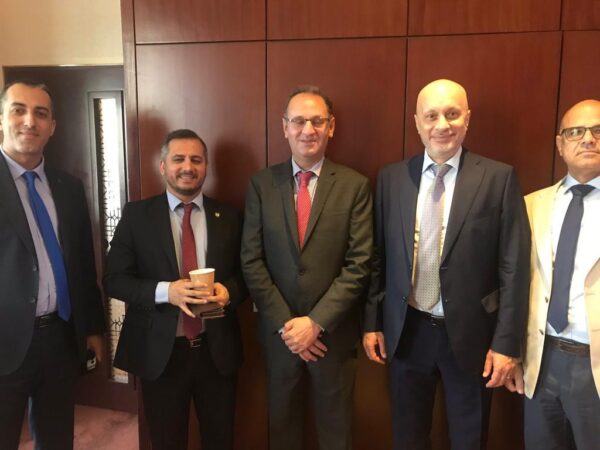IBBC and GEMS host Iraq education conference in Dubai and resolve to focus on important outcomes

On the eve of IBBC’s Dubai Iraq conference, GEMS and IBBC together hosted and convened an important education conference bringing together key Government of Iraq and KRG ministerial representatives, UK universities, IBBC members and Skills and education qualification and training organisations such as City and Guilds, AQA, Cambridge university press and IBBC members to discuss the topic ‘Education is the foundation for rebuilding Iraq’.
The conference was chaired by Dr Amir Saadati, Executive director or GEMS, and Prof Mohammed Al-Uzri (IBBC Health and Education advisor).
Opening remarks were delivered by:
Ambassador Mark Bryson-Richardson MBE – UK Ambassador to Iraq
Prof Alaa Abdulhasan Atiyah – Advisor, MOHESR, Iraq
Dr Muhammad Shukri – Chairman of the Kurdistan investment board, KRG.
Dr Muhammed Hussein Amad- KRG ministry of higher education
Mr Christophe Michels, IBBC MD.
In addition, there was insightful contribution from Mr Amanj Raheem, Cabinet Secretary (KRG)
The 1st session focused on vocational training as an area of huge needs in Iraq. Vice president of Middle Technical University in Iraq provided overview of the current status of vocational education in Iraq. The panel included Dr Naji Al Mahdi, the CEO of vocational education for the Dubai Government, who outlined how education is not a singular subject but is an integrated component for the success of any society. It therefore needs broad thinking which includes understanding how the nations culture’s need to be understood and used. Iraq as a nation has a young population that is growing annually and how the nation deals with relating education to the availability and range of sustainable jobs is a vital theme for the Government, educators, and business leaders together. Bringing skills that are related to business needs is a jigsaw that start in primary education on how to learn but then builds through training development. This was further emphasized by panel members from City and Guild, and Stirling Education.
The 2nd session was on Academic and business collaboration with insight from Ministry of Higher Education and Scientific Research on efforts to facilitate closer collaboration between universities and business in Iraq. Followed by update from University of London and Cambridge University Press & Assessment on their collaboration in the Kurdistan region of Iraq.
The 3rd session was on Quality in Education with brief update on MOHESR governmental programme to enhance quality of education. Followed by contribution from CEO of Alphaplus Consultancy (Oxford AQA) and CEO of the learning resource network (LRN) on how best to measure and define quality, with the key outtakes to include measuring the outcomes from education and courses for both Universities and via student feedback, including how many graduates obtain jobs.

The conference concluded with discussion on the practical things each delegate can do to improve education, from improving teaching at all levels, ensuring all children attend primary school, to better skills uptake with industry and academia, to ensure more women are represented in education and ministries, to increase collaboration with GOI and UK Universities to modernise the curricula for today’s world and ensure the outcomes are relevant and measured for all institutions, to drive up quality of delivery and teaching.
The conference provided good opportunity for networking between interested parties and exploration of future collaboration projects.